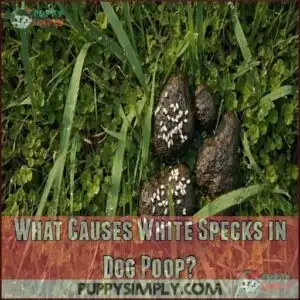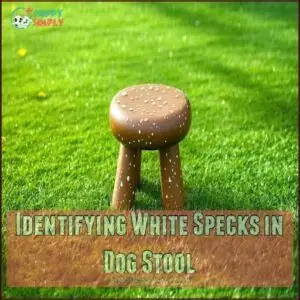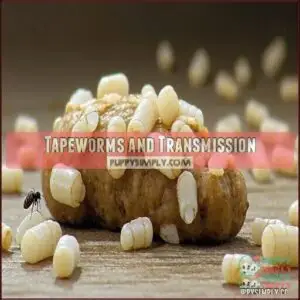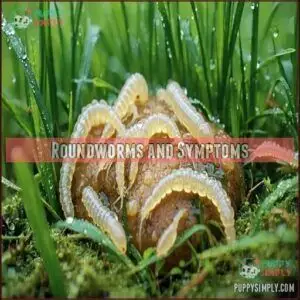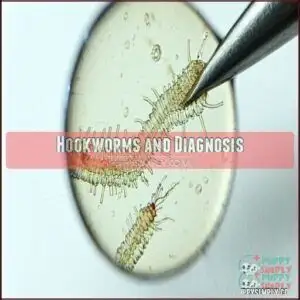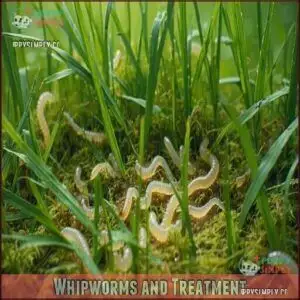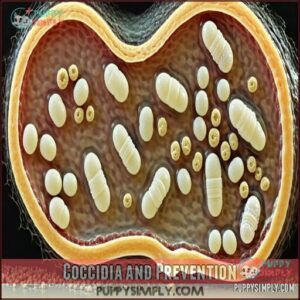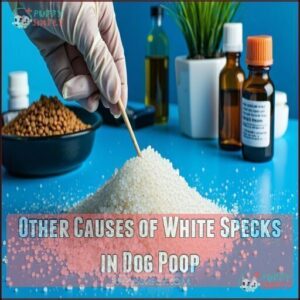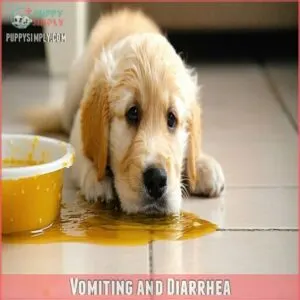This site is supported by our readers. We may earn a commission, at no cost to you, if you purchase through links.
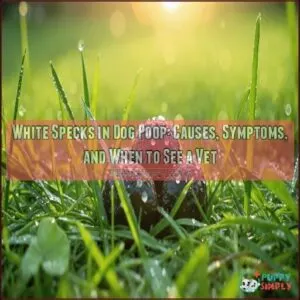 Spotting white specks in your dog’s poop can feel unsettling, but it’s not always a red flag.
Spotting white specks in your dog’s poop can feel unsettling, but it’s not always a red flag.
Common culprits include intestinal parasites like tapeworms, bits of undigested food, or even tiny foreign objects they’ve swallowed. Sometimes, excessive calcium (like from too many bones) or environmental factors, like fly eggs, can also leave traces.
If the specks move, parasites are likely the cause—time to call your vet. Non-moving specks might mean dietary quirks or something harmless.
Keep an eye on your pup’s behavior and digestion; if anything seems off, a vet visit can clear up the mystery. Better safe than sorry!
Table Of Contents
- Key Takeaways
- What Causes White Specks in Dog Poop?
- Identifying White Specks in Dog Stool
- Common Types of Intestinal Parasites
- Other Causes of White Specks in Dog Poop
- Symptoms of Worms and Parasites in Dogs
- Treatment and Prevention of White Specks
- Managing Your Dog’s Environment
- When to Consult a Veterinarian
- Frequently Asked Questions (FAQs)
- Why are there white spots in my dog’s poop?
- What do tapeworms look like in dog poop?
- What are the white moving things in my dog’s poop?
- What are the signs of worms in dogs?
- Can dogs get rid of tapeworms on their own?
- Why does my dog have white specks in his poop?
- What are the white seeds in my dog’s poop?
- What do parasite eggs look like in dog poop?
- What are white specks in poop?
- What causes white specks in dog poop?
- Conclusion
Key Takeaways
- White specks in your dog’s poop could mean parasites like tapeworms, undigested food, or environmental factors like fly eggs.
- If the specks move, it’s often a sign of worms, so contact your vet immediately for diagnosis and treatment.
- Non-moving specks might come from dietary reasons like undigested food or excess calcium from bones.
- Regular deworming, flea prevention, and a balanced diet can help keep your dog healthy and prevent such issues.
What Causes White Specks in Dog Poop?
Spotting white specks in your dog’s poop can be a bit unsettling, but the causes are usually straightforward.
White specks in your dog’s poop might look worrisome, but they’re often manageable with proper care and attention.
These specks might come from parasites, undigested food, or other harmless factors, though some cases may need attention.
Intestinal Parasites
When spotting rice-like white specks in dog poop, parasites like tapeworms, roundworms, or hookworms are often behind it.
Intestinal worms are sneaky but treatable.
Key points to remember:
- Tapeworms are fleas’ gift to dogs.
- Roundworms are common in puppies and zoonotic risks for humans.
- Regular fecal exams catch parasites early.
- Deworming schedules keep your dog parasite-free.
Undigested Food Particles
Sometimes, white specks in dog poop are simply undigested food remnants.
Grains like rice and corn, common in dog diets, can pass through if not fully broken down.
Raw diets or malabsorption issues may also cause these white specks.
If it’s a regular sight, consider dietary adjustments like adding enzymes or upping fiber.
Watch for pica concerns—dogs eating non-food items may show similar poop patterns.
Foreign Objects
Dogs love exploring with their mouths, which sometimes leads to swallowing unusual things.
White specks in dog poop might be the result of object ingestion, a common issue tied to curiosity or pica behavior.
- Toy materials like stuffing or fabric scraps
- Capsule casings from undigested medications
- Bits of cotton, paper, or plastic
Watch for blockage symptoms like vomiting or lethargy and contact your vet if needed.
Excessive Calcium
Too much calcium in your dog’s diet can sneak up on you, often showing as chalky, crumbly white specks in their poop.
This happens with excess bone consumption, calcium supplements, or raw diets.
Overdoing it might even cause hard stools, constipation, or bloating.
Puppies need calcium for growth, but balance is key—too much can strain their kidneys.
Limit bone-chewing to 15-minute sessions, twice a week, and check with your vet about adjusting calcium levels if issues persist.
Fly Eggs and Larvae
If you’ve noticed tiny white specks in your dog’s poop, it could be fly larvae or maggot eggs, often caused by leaving waste outdoors too long.
Flies quickly lay eggs, leading to larvae within hours.
Here’s a quick guide:
- Larvae Identification: Maggots look like tiny, wiggling rice grains.
- Fly Lifecycle: Eggs transform into larvae rapidly on feces.
- Prevention Methods: Prompt cleanup eliminates infestation risks.
Dispose of waste quickly and maintain hygiene to avoid this unpleasant situation!
Identifying White Specks in Dog Stool
When you notice white specks in your dog’s stool, it’s important to figure out what’s causing them.
Checking for movement and consistency can help you determine if they’re parasites, undigested food, or something else.
Moving Specks and Parasites
Spotting something wiggling in dog poop is unsettling, but it likely points to parasites.
Tapeworms resemble rice-like worms from fleas, while roundworm mobility shows long, spaghetti-like movements in contaminated soil.
Hookworms in dogs are thread-thin with darting motion, often caught in infected areas.
Whipworms, although subtle in visibility, whip around in contaminated water.
Deworming effectiveness guarantees parasites don’t linger.
Non-Moving Specks and Other Causes
Sometimes white specks in dog poop are harmless.
Undigested food, like rice or bone fragments, often causes these.
Excess calcium in dog poop can leave behind crumbly, chalky bits.
Foreign ingestion, such as toy stuffing, might also appear.
Medications can show as white residue due to undissolved capsules.
If poop is left outdoors, fly larvae could develop, resembling tiny white flecks.
Malabsorption issues or fungal infections may contribute too.
Monitoring for Symptoms
Pay attention to your dog’s behavior alongside those white specks in dog poop.
Any appetite shifts, behavioral changes, or drops in energy levels might suggest something more serious, like dog stool parasites.
It’s like piecing together a puzzle—hydration status and poop consistency also matter.
Quick action keeps minor issues from turning into a bigger mess for your pup!
Fecal Scoring Charts
Understanding a fecal scoring chart simplifies your dog poop analysis, especially when spotting white specks in dog poop.
Healthy stool typically hits these benchmarks:
- Color: Chocolate brown with no odd streaks.
- Shape: Log-like or in well-defined segments.
- Consistency: Firm yet moldable, like play-dough.
- Surface: Slightly moist, not sticky.
- Size: Matches their diet and breed variations.
Regular health monitoring makes certain of quick detection of issues like dog stool parasites or dietary impact.
Common Types of Intestinal Parasites
White specks in your dog’s poop could be a sign of intestinal parasites like tapeworms, roundworms, or hookworms.
These pesky invaders don’t just upset your dog’s stomach—they can also affect their overall health if left untreated.
Tapeworms and Transmission
Tapeworms in dogs are sneaky parasites with a fascinating story.
They latch on through flea transmission, with ricelike worms—shed proglottids—visible in dog stool.
Fleas ingest tapeworm eggs, completing their lifecycle inside your pet after ingestion.
| Route | Risk Level | Prevention |
|---|---|---|
| Flea transmission | High | Monthly flea treatments |
| Eating raw meat | Moderate | Avoid undercooked foods |
| Sharing contaminated areas | Moderate | Yard clean-up, hygiene |
Roundworms and Symptoms
Roundworms in dogs are a sneaky parasite, often showing up as white specks in dog poop or spaghetti-like strands. They’re common in puppies and pose a zoonotic risk.
Look for these dog symptoms:
- Potbelly with unexplained weight loss.
- Coughing tied to the roundworm lifecycle.
- Dull, unkempt coat.
- Vomiting containing worms.
Diagnostic tests confirm infections. Treatment efficacy improves with prompt action!
Hookworms and Diagnosis
Hookworms, tiny blood-sucking parasites, can invade a dog’s intestines without obvious signs like white specks in dog poop.
Diagnosis relies on stool analysis and microscopic identification due to these parasites’ elusive nature.
| Symptom | Diagnosis | Urgency |
|---|---|---|
| Pale gums | Fecal flotation | High urgency |
| Dark stool | Microscopic exams | Critical care |
| Weakness | Blood tests | Medium priority |
Their zoonotic potential makes timely treatment imperative. especially for puppies and seniors.
Whipworms and Treatment
Whipworms are stubborn dog intestinal parasites with a tough whipworm lifecycle.
These pests burrow into your dog’s intestinal wall, causing inflammation, diarrhea, or vomiting.
You won’t usually see them in your pup’s poop, but their microscopic eggs can linger in soil for years. Diagnosis often requires fecal flotation testing by your vet.
Treatment options include deworming dogs with medications like fenbendazole or moxidectin.
Since reinfection is common, prevention strategies like regular dog parasite treatment and environmental control are key.
Stay proactive, and your furry friend will thank you!
Coccidia and Prevention
Coccidia are tiny parasites that silently upset your dog’s intestines, often resulting in diarrhea or white specks in stool.
Unlike larger worms, you can’t see them without a microscope, so a vet’s help is necessary for a proper diagnosis. Typical symptoms include watery poop, bloody diarrhea, or weight loss.
If coccidia in dogs is confirmed, your vet may prescribe specific medications. Regular fecal examinations are fundamental for detection.
To help keep this intruder away, focus on prevention:
- Keep your dog’s living area clean and dry.
- Remove poop promptly.
- Avoid crowded dog parks or kennels.
- Practice regular dog deworming.
- Feed high-quality diets, boosting their digestion.
Other Causes of White Specks in Dog Poop
White specks in dog poop aren’t always caused by parasites; other factors can explain their presence. Undigested food, medications, or even environmental issues might be behind these tiny surprises.
Undigested Bone Fragments
Feeding raw bones or bone-rich foods can sometimes result in undigested bones appearing as dog poop white specks.
These bone bits can vary in size, depending on digestion enzyme impact and fragment size.
To counter raw diet risks, limit bone consumption to short, supervised sessions.
Overloading on bones or poor commercial food quality may cause digestive issues, so balance is key for happy, healthy digestion.
Ingested Toys and Materials
Toy ingestion risks are common with dogs, especially avid chewers.
Ingested stuffing, fabric, or plastic often appear as dog poop white specks.
Most foreign objects, like small material pieces, pass naturally. However, larger items can cause dangerous blockages.
Watch for blockage symptoms like vomiting, appetite loss, or lethargy.
Prevent issues by offering safe chews and monitoring indiscriminate eating. Pica prevention and choosing digestible dog chew items reduce risks of harmful ingestions or unsightly material in poop.
Medication and Stool Color
Medications like antibiotics or supplements can change dog stool color, sometimes leaving white specks.
Some culprits include barium effects, static capsule residue, or discoloration causes linked to how pills dissolve.
Watch for these changes, as they might signal malabsorption impact or nutrient deficiency.
Here’s a quick checklist:
- Note new medications: white specks might appear.
- Check stool consistency for unusual colors.
- Bring stool samples to your vet.
- Ask about appropriate dog stool analysis.
Environmental Factors and Poop
Sometimes, white specks in your dog’s poop come from environmental risks rather than health issues.
Outdoor exposure introduces unexpected elements that mimic parasites.
For example, fly larvae (maggots) may hatch from eggs laid on poop left outside too long. Contaminated sources, like soil or water, can also mix with stool.
Regular yard hygiene helps prevent these surprises.
- Fly larvae: Tiny white specks from eggs on uncollected poop.
- Plant debris: Grass or leaves from grazing might pass through.
- Soil particles: Dirt may stick to or mix with stool during cleanup.
- Pebbles: Small stones eaten or tracked in.
- Environmental parasites: Worms or bacteria from contaminated soil.
Symptoms of Worms and Parasites in Dogs
When your dog has worms or parasites, symptoms can range from diarrhea and vomiting to weight loss and a dull coat.
You might also notice behaviors like scooting or scratching, which could signal discomfort or irritation.
Vomiting and Diarrhea
When your dog has vomiting and diarrhea with white specks in their poop, it could point to parasitic infections or dietary changes.
Watch for dehydration risks or electrolyte imbalance.
If your dog vomits once, monitor them closely. Multiple episodes or puppy diarrhea? Restrict food briefly and offer water.
Bloody or projectile vomiting are emergency signs—seek help immediately!
Medication side-effects can also cause dog diarrhea, so consult your vet for safe solutions and tips.
Regular deworming is key, as fecal exams detect worm eggs, confirming infestation.
Abdominal Discomfort and Weight Loss
If your pup’s belly is acting up, worms or other parasites might be the culprit behind abdominal discomfort and dog weight loss. These pesky critters rob nutrients, even with a normal appetite, causing digestive issues and malabsorption signs.
Worms could be silently stealing nutrients, leaving your pup with tummy troubles and unexplained weight loss despite eating well.
- Pain Assessment: Sensitivity when touched
- Appetite Changes: Still eating but losing weight
- Bloating Causes: Potbelly look or stomach noises
- Energy Levels: Noticeable drop
- White spots in stool: A telltale warning
Itchy Skin and Dull Coat
An irritated dog scratching endlessly with a dull coat might’ve more than dry skin—it’s often a sign of worms or other dog parasites.
These pests weaken nutrient absorption, causing a brittle, lifeless coat.
Check this table for signs:
| Symptom | Possible Cause | Action to Take |
|---|---|---|
| Itchy skin | Allergy/Worms | Allergy testing |
| Dull coat | Dietary deficiencies | Omega supplements |
| Raw patches | Skin infections | Vet check & grooming |
Healthy grooming practices uncover dog health concerns early!
Pale Gums and Weakness
Pale gums and weakness can mean serious trouble, hinting at anemia signs or oxygen deficiency caused by blood loss from worms or other intestinal parasites.
Your dog may seem tired, uninterested in play, or lagging on walks.
Check their gums—healthy ones are pink, but whitish or grayish gums signal dog health concerns.
These symptoms might suggest organ failure or parasite infestation.
Don’t wait—veterinary intervention is imperative.
Treatment and Prevention of White Specks
Treating and preventing white specks in your dog’s poop starts with identifying the root cause, like parasites or diet issues.
With proper care, including deworming, flea control, and a balanced diet, you can help keep your pup happy and healthy.
Deworming and Flea Control
Keeping white specks out of your dog’s poop means fighting worms and managing fleas.
A solid plan includes:
- Stick to a deworming schedule every 3–6 months, especially for active dogs.
For a more thorough approach, consider following a consistent deworming timeline.
- Use year-round flea prevention to break the tapeworm life cycle.
- Pick up poop daily for better environmental control and fewer reinfestations.
- Talk to your vet about medication types to avoid resistance issues and guarantee effectiveness.
Probiotics and Digestible Diets
When your dog’s gut microbiome needs a boost, probiotics can help balance digestion and reduce white specks in poop.
Look for supplements with strains like Lactobacillus to aid dog digestion and support overall health.
Pair this with digestibility factors like limited-ingredient diets for sensitive pups or enzyme supplementation, which helps senior dogs process nutrients better.
During diet shifts, offer bland foods like boiled chicken to soothe dog digestive issues.
Probiotic benefits and thoughtful dog nutrition can make all the difference in your dog’s diet and digestion.
Many owners find that probiotics aid digestion.
Removing Foreign Objects and Preventing Ingestion
Curious pups can turn anything into a snack, leading to trouble like dog bowel obstructions.
Here’s how to prevent pica and nibbling on foreign objects:
- Secure trash with tight lids to limit access.
- Swap fragile or worn toys for safe chew toys during playtime.
- Supervise playtime with new chews to spot issues early.
- Remove hazards like bone bits or toy strings to avoid accidents.
These steps make nibbling prevention manageable and keep your pup safe!
Regular Deworming and Veterinary Care
Spotting white specks? Regular deworming and veterinary care can make all the difference in keeping your furry friend healthy.
Stay ahead of worms like tapeworms or roundworms with these steps:
- Stick to a deworming schedule every 3-6 months, especially for adventurous dogs.
- Schedule fecal exams annually to catch hidden parasites early.
- Partner with your vet—vet consultations and preventative medication assure early detection and effective treatment for every tail wag.
Undigested food particles can also appear as white specks.
Managing Your Dog’s Environment
Keeping your dog’s environment clean and controlled can stop white specks in poop before they start.
From cleaning up waste promptly to managing diet and flea prevention, small steps make a big difference.
Removing Poop and Preventing Infestation
Scooping up dog poop isn’t just about cleanliness—it’s about larvae control and keeping your pup safe.
Waste disposal within 12 hours stops flies from laying eggs.
Make it part of your routine: remove dog waste daily and sanitize the area to avoid parasites. A weekly deep clean keeps the yard a safe environment for your dog.
Think of it as preventative measures against worms and parasites—your cleaning practices can make all the difference in your dog’s health.
Controlling Fleas and Ticks
Fleas and ticks aren’t just a nuisance—they can lead to serious issues like tapeworm infections, making pest control a top priority in your dog’s care routine.
Keep these critters at bay with a solid plan:
- Use flea and tick medication year-round to disrupt the flea lifecycle in all seasons.
- Groom weekly with a flea comb, checking for signs over white paper.
- Incorporate natural options, like diatomaceous earth, around common tick habitats for extra environmental control.
Preventative medication plus consistent care equals worry-free, wagging tails!
Fleas thrive in dark and moist environments, so regular lawn maintenance can help reduce flea habitats.
Limiting Bone Consumption
Bones can be fun for dogs, but overindulgence may lead to issues like dog chalky stool and undigested bones in dog poop.
Limit bone chewing to safe sessions—twice weekly for 15 minutes—and supervise your pup during chew time.
Oversized or hard bones may cause Raw Diet Concerns or Bone Treat Dangers, especially in puppies.
Try safer alternatives to manage dog excessive calcium.
Here’s a quick guide:
| Issue | Cause | Solution | Frequency |
|---|---|---|---|
| Chalky stool | Excessive calcium | Reduce bone chewing | Twice a week |
| Undigested bones | Hard bone fragments | Switch to alternatives | As needed |
| Risk in puppies | Fragile digestion | Safer treats | Ongoing |
| Raw Diet Concerns | Bone overuse | Balanced nutrition | Monitor |
Providing a Balanced Diet
A balanced diet keeps your dog’s poop healthy and free of white specks. Providing the right nutrient ratios supports digestion and limits issues like undigested food or excess calcium.
Whether your pet’s on a BARF diet or store-bought food, portion control is key.
Thinking of homemade diets? Talk to your vet about supplement needs to avoid gaps in nutrition.
-
Key tips:
- Choose age-appropriate, high-quality dog food.
- Monitor calcium intake in raw diets.
- Consult a vet for homemade meal plans.
- Guarantee balanced nutrient ratios daily.
When to Consult a Veterinarian
If you notice white specks in your dog’s poop and they don’t go away or are moving, it’s time to call the vet.
Persistent symptoms like vomiting, diarrhea, or changes in behavior also shouldn’t be ignored.
Symptoms of Infection or Obstruction
When your dog’s not acting like themselves, it’s time to look closer.
Signs of infection or obstruction shouldn’t be ignored—they can escalate fast.
Watch for these telltale symptoms:
- Lethargy signs paired with frequent vomiting or straining during defecation
- A swollen, hard belly, or signs of abdominal pain like yelping when touched
- Complete appetite changes, such as refusal to eat for over 24 hours
- Worms like tapeworm or roundworm in stool analysis
Any of these could point to dangerous parasites or blockages.
Don’t wait—call your vet immediately.
Early treatment can prevent complications, keeping your furry friend healthy and back to chasing tennis balls in no time.
Changes in Poop or Behavior
Noticed changes in your dog’s poop or behavior?
Keep an eye out for white specks, abnormal stool consistency, or increased flatulence.
Appetite shifts, like skipping meals or eating too much, can also signal something’s off.
Lethargy signs, such as low energy or hiding, could indicate underlying issues like worms or tapeworms.
Track these signs daily and document stool changes with photos.
Diet tweaks might help, but trust your gut—your vet will appreciate those details!
Diagnosis and Treatment Options
Your vet might suggest starting with a fecal examination to pinpoint the cause of those white specks.
Collect a fresh stool sample (within 12 hours) for accurate results.
If worms like tapeworms are detected, a fecal test confirms the type, and a dewormer will handle treatment.
For recurring issues like puppy white poop, a deworming schedule, diet adjustment, or specific medication types may be recommended.
Addressing parasites often involves treating all household pets.
Preventing Future Health Issues
Caring for your dog’s health isn’t just reacting to issues—it’s staying ahead of them. Regular checkups, a good diet, and clean spaces can keep your furry friend feeling great. Pay attention to their poop; it tells a lot about their health.
- Use proactive deworming to protect against worms and parasites.
- Stick to safe chews and balanced meals for dietary management.
- Dispose of waste immediately to prevent infections.
- Schedule routine vet visits for peace of mind. Biannual visits are important for senior dog checkups to monitor their health as they age.
Frequently Asked Questions (FAQs)
Why are there white spots in my dog’s poop?
Ever heard the saying, "Not everything that glitters is gold"?
White spots in your dog’s poop could mean undigested food, parasites like tapeworms, or even fly larvae.
Check with your vet to rule out causes.
What do tapeworms look like in dog poop?
Tapeworms in dog poop look like tiny, white segments resembling grains of rice.
These segments may wiggle slightly and often contain eggs.
They’re a clear sign of infestation, typically requiring deworming and flea control treatment.
What are the white moving things in my dog’s poop?
The white moving things in your dog’s poop are likely tapeworm segments.
They look like tiny grains of rice and move slightly.
Fleas usually transmit tapeworms, so treating your dog and environment is essential.
What are the signs of worms in dogs?
You might notice signs like weight loss, vomiting, diarrhea, a bloated belly, or scooting their rear on the floor.
Visible worms or moving segments in poop or near the tail are also telltale clues.
Can dogs get rid of tapeworms on their own?
Dogs can’t get rid of tapeworms naturally—the parasites need effective treatment.
Fortunately, medication from your vet safely handles the problem.
Left untreated, tapeworms will hang around, so it’s best to address them quickly and thoroughly.
Why does my dog have white specks in his poop?
Your dog’s poop could have white specks from undigested food, parasites like tapeworms, or even environmental factors like fly eggs.
If the specks move or persist, talk to your vet for proper diagnosis and treatment. If the specks move or persist, talk to your vet for proper diagnosis and treatment.
What are the white seeds in my dog’s poop?
It’s likely tapeworm segments, often resembling rice grains.
These can point to a flea-related parasite issue.
Check for moving specks, as they signal worms.
A vet’s deworming treatment and flea prevention will resolve this.
What do parasite eggs look like in dog poop?
Parasite eggs in dog poop often look like tiny, oval or round specks, sometimes with a shell-like coating.
They’re usually too small to see clearly without a microscope, but tapeworm segments resemble rice grains.
What are white specks in poop?
Sometimes life’s messy moments reveal surprises—white specks in poop can mean anything from harmless undigested food, like rice, to parasites like tapeworms.
Keep a close eye and consult your vet for clarity.
What causes white specks in dog poop?
White specks in poop could mean undigested food, tapeworms, or environmental exposure like fly eggs.
If the specks move, it’s often worms.
Keep your dog’s diet balanced, deworm regularly, and consult a vet for persistent issues.
Conclusion
Imagine spotting those little white specks in your dog’s poop during a routine backyard cleanup—it can be puzzling.
Whether it’s parasites, undigested food, or something harmless like bone fragments, paying attention is key.
Watch for symptoms like behavioral changes, diarrhea, or irritability.
If the specks move, contact your vet immediately, as parasites might be the culprit.
For non-moving specks, monitor your dog’s diet and habits.
Regular vet checkups help guarantee those white specks are nothing serious.
- https://link.springer.com/article/10.1007/s12639-015-0706-9
- https://www.proplanveterinarydiets.ca/sites/g/files/2021-02/180107_PPPVD-Fecal-Scoring-Chart-UPDATE-EN-FINAL.pdf
- https://pubmed.ncbi.nlm.nih.gov/10528538/
- https://www.ncbi.nlm.nih.gov/pmc/articles/PMC3215466/
- https://vcahospitals.com/know-your-pet/malabsorption-bacterial-overgrowth-in-dogs

